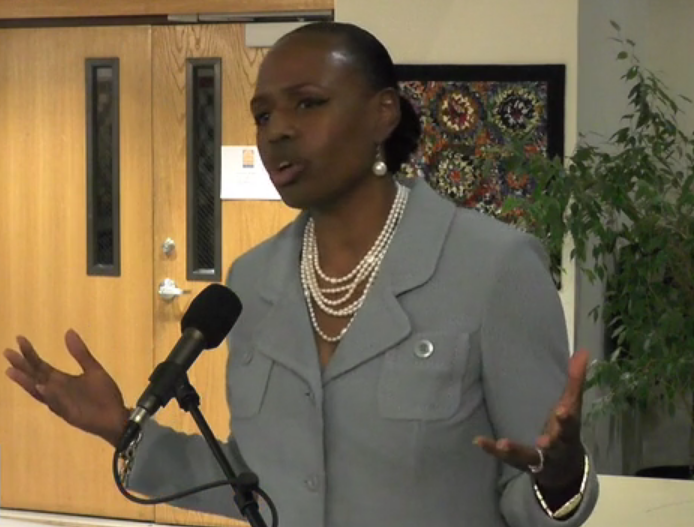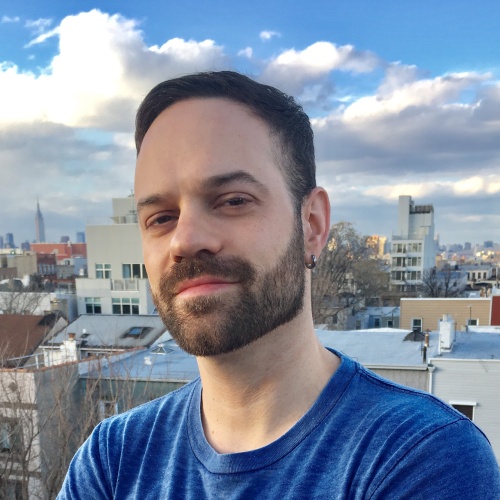Reframing campaign finance as a civil rights issue

Speaking at a recent forum on campaign finance as a civil rights issue, Nicole Austin-Hillery of the Brennan Center for Justice urged reform advocates to speak about money in politics in terms ordinary people can understand. (Image is a still from the video below.)
To help build the movement addressing the problem of big money in politics, reformers need to reframe the issue in a way that engages voters by emphasizing issues that affect their daily lives. That was the message from an Oct. 15 forum in Durham, North Carolina titled "Money in Politics as a Civil Rights Issue" that brought together a panel of elected officials, legal scholars and reform advocates.
Reformers should articulate "campaign finance as the problem of political participation," said Professor Guy-Uriel Charles, founding director of the Center on Law, Race and Politics at the Duke University School of Law in Durham. "[Campaign finance] is a civil rights problem."
Charles detailed how the U.S. Supreme Court's 1976 decision in the landmark campaign finance case Buckley v. Valeo framed regulation of money in politics as a corruption issue. That put reformers at a disadvantage, he said, because corruption can be complex to explain and talking about it deflects from highlighting the "values that we would like to see reflected in a system of campaign finance." Noting that those who "call the tunes" in politics are mostly white and male, Charles said reformers should instead focus on campaign finance as a civil rights issue.
"We must … build a different type of a civil rights movement from the ground up, from the grassroots, that rethinks political participation as a right for all," he said.
Nicole Austin-Hillery, an attorney with the Brennan Center for Justice's Washington, D.C. office, emphasized the need to speak about money in politics in terms that non-experts can understand. It's the job of reformers to explain to ordinary people how money in politics impacts their lives, she said — for example, how public financing systems make it possible for average Americans to run for office.
"Communities are going to start pay attention to this issue when they understand that it is about empowering them and helping them to figure out how they make changes in their communities," Austin-Hillery said.
Current North Carolina Supreme Court Justice Cheri Beasley, only the second African-American woman to sit on the state's high court, discussed her campaigns for the state Court of Appeals in 2008 and the state Supreme Court in 2014. During that first campaign, Beasley participated in North Carolina's nationally acclaimed judicial public financing program. But by 2014, the Republican-controlled legislature had killed the program, and she had to spend much more time fundraising.
"It is important that our judiciary remain independent," Beasley said. "That is the one place where people … believe they will receive a fair and partial decision, and there should be not one thing that compromises that."
The event coincided with the release of an Institute for Southern Studies report titled "The Face of Election Money in North Carolina." It found that despite the state's increasing racial diversity 95 percent of the biggest North Carolina political donors in seven major federal contests were non-Hispanic whites.
Chris Kromm, the Institute's executive director and publisher of Facing South, discussed the report and how "the flood of big money is drowning out the voices of ordinary voters."
Also speaking on the panel was Floyd McKissick, a North Carolina state senator representing Durham since 2007. He tied big money in the political system to such drastic changes in recent years as the 2010 redistricting and the end of judicial public financing in the state. McKissick hailed the citizen protesters at the Moral Monday demonstrations that have taken place across the state as an example of the kind of grassroots engagement it will take to make the political process work for the common good.
The forum was moderated by Bob Hall, executive director of elections watchdog Democracy North Carolina, which co-sponsored the event along with the Institute for Southern Studies, Free Speech for People, N.C. Voters for Clean Elections, the Southern Coalition for Social Justice, and the American Constitution Society student chapters at Duke, N.C. Central and UNC law schools. Watch a recording of it here:
The forum continued with a question and answer session that's online here. Prior to the forum, the Raleigh public affairs show Capital Tonight hosted a discussion with Kromm, McKissick, and Free Speech for People's president and co-founder, John Bonifaz; watch it here. Public News Service previewed the event here.
Tags
Alex Kotch
Alex is an investigative journalist based in Brooklyn, New York, and a reporter for the money-in-politics website Sludge. He was on staff at the Institute for Southern Studies from 2014 to 2016. Additional stories of Alex's have appeared in the International Business Times, The Nation and Vice.com.
